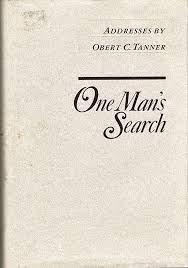Articles/Essays – Volume 23, No. 1
A Great Heart and a Fine Mind | Obert C. Tanner, One Man’s Search
Few men have had a greater impact on the cultural life of contemporary Utah than has Obert C. Tanner. Through countless philanthropic endeavors, he and his wife, Grace, have guaranteed a quality of life otherwise unobtainable for residents of their native state. From symphonies and choruses to amphitheaters, parks, fountains, and lectures, the Tanners have endowed the region with genuine cultural opportunity. Most late twentieth-century Utahns readily associate the Tanners with this legacy of sharing. This book, however, offers a genuine insight into another side of Obert C. Tanner.
Above everything else, Tanner is an activist philosopher and philanthropist. His lifelong dual career as businessman and teacher provides a role model for associates and students. Obert C. Tanner’s life and speeches document one man’s continuing quest to better the world.
One Man’s Search contains thirty speeches delivered by Tanner at a variety of business, professional, and academic gatherings. The book is divided into five sections: “World Peace,” “Truth and Education,” “Religion,” “Freedom and Democracy,” and “Values.” Each section deliberates the multi-faceted Tanner philosophy and is introduced with a brief essay by one of Tanner’s distinguished colleagues. From Sterling McMurrin’s concise and illuminating introduction to the end of the book, this volume captures the breadth of O. C. Tanner.
The basic theme of independence and freedom permeates each speech. Tanner is a genuine champion of those who need to be heard and those whose ideas run contrary to popularly held opinion. In the section on “World Peace,” he carefully and brilliantly outlines how the world must move away from and beyond the hatred and fear that characterized the Cold War world. It took the U.S. government more than ten years to implement a policy that Tanner understood in 1959 and 1960. Tanner fiercely believed that Russians would be free to speak and write only when Americans could shed their fear of the Soviets.
Teachers can be heartened by his common-sense approach to education. Tanner was the son of a polygamist, college president and businessman who lived in Canada, and a hard-working, caring mother who lived in Utah. Though his childhood was often difficult, he believed fervently that education was the key to many doors, both intellectual and material. His life demonstrates a never-ending pursuit of truth and an abiding commitment to the value of education.
Tanner’s speeches on religion and democracy pursue a similar course. He is concerned about individuals working together to improve humankind. That makes both religion and government valuable. However, the soul of his philosophy is found in the section on “Values.” Tracking humanity’s eternal quests for harmony and balance, Tanner the philosopher describes what is reasonable and probable and good. Readers will be moved by the depth of his understanding and by his obvious continual search for clear insight. Naturalistic beauty and individual freedom are once again prevalent values as the search continues.
These speeches are almost overwhelmingly straightforward, clear, and accessible. They are designed not to confound but to create, to teach. They succeed admirably and with distinction. Tanner is a gem of genuine quality in an age of confused compromise. His courage and consistency admirably document a life devoted to both creativity and preservation.
This handsome volume deserves to be read and reread. It is a sensible approach to life’s complexities and opens a window on one of Mormondom’s great hearts and minds. We can now look forward to O. C. Tanner’s autobiography, One Man’s Journey, which should be published within the next year.
One Man’s Search, Addresses by Obert C. Tanner (Salt Lake City: University of Utah Press, 1989) forward, 317 pp., $25.00


 Back to full Issue
Back to full Issue

